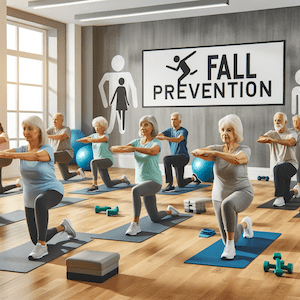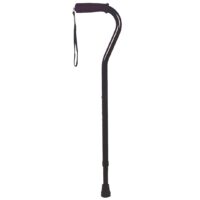Falls Prevention
Article by John Miller


Fall Prevention
A Physiotherapist’s Guide to Staying Upright and Active
Introduction
Falls are a significant concern, especially as we age. They can lead to serious injuries, including fractures, loss of independence, and a reduced quality of life. However, fall prevention is achievable with the right approach. As physiotherapists, we are committed to guiding you through effective strategies for fall risk reduction. This includes enhancing balance and ensuring you have the tools to prevent falls in your daily life.
Understanding the Risks
Before discussing prevention strategies, it’s crucial to understand why falls occur. Factors contributing to falls include muscle weakness, balance issues, poor vision, vestibular disorders, certain medications, and environmental hazards. Recognising these risks is the first step towards prevention.
Recent Research
Recent studies have highlighted the importance of physiotherapy in reducing fall risks. One study, published in the ‘Journal of Physiotherapy’, demonstrated a significant reduction in fall rates among older adults who engaged in tailored exercise programs.
Fall Risk Reduction Strategies
1. Comprehensive Balance Evaluation
Impaired balance and the ability to swiftly recover from an off-balance incident are leading causes of falls. Your physiotherapist stands as the most qualified healthcare professional to conduct a thorough assessment of your balance. Following this evaluation, they will discuss your results in detail and recommend the most effective falls prevention strategies tailored to your needs.
2. Tailored Exercise Programs
Exercise is key to fall prevention. A physiotherapist can design a personalised program that focuses on strengthening muscles, improving balance, and enhancing coordination. These exercises often include:
Leg strength training: Strengthening your legs improves support and stability.
Read more about Strengthening.
Balance exercises: These exercises help you maintain stability and react to changes in your environment.
Read more about Balance Improvement Exercises.
Group Balance & Falls Prevention Classes: Sometimes group sessions are a great motivator. There is also a social component to the physical positive.
Read more: Balance & Fall Prevention Group Exercise Classes
3. Home Safety Assessment
Many falls happen at home. A physiotherapist can help assess your home for potential hazards like loose rugs, poor lighting, or slippery surfaces and suggest modifications to make your home safer.
4. Gait Analysis and Training
Your walking pattern, or gait, can increase your risk of falling. A physiotherapist can analyse your gait and recommend exercises or assistive devices to improve your walking stability.

Balance and Falls Prevention
Improving balance is a cornerstone of fall prevention. Balance exercises, such as standing on one leg or walking heel-to-toe, can significantly enhance your ability to maintain stability. Additionally, activities like Tai Chi have been shown to improve balance in older adults.
Technology and Fall Prevention
Advancements in technology offer new ways to reduce fall risks. Wearable devices can monitor gait and balance, providing real-time feedback for adjustments. Virtual reality (VR) is also emerging as a tool for balance training in a safe, controlled environment.
Lifestyle Factors
Lifestyle plays a vital role in fall prevention. Adequate nutrition, staying hydrated, and managing medications are all crucial. Furthermore, maintaining social connections and mental health can indirectly reduce fall risks by promoting an active, healthy lifestyle.
Conclusion
Fall prevention is an achievable goal. Through tailored exercises, home safety assessments, and lifestyle changes, you can significantly reduce your risk of falls. Remember, balance enhancement and fall risk reduction are ongoing processes that require commitment and regular practice.
Seek Professional Advice
We encourage you to seek the professional advice of a physiotherapist. They can provide a comprehensive assessment and develop a personalised plan to keep you safe and active. Don’t wait until a fall occurs; take action today to protect your independence and quality of life.
Remember, preventing falls isn’t just about staying on your feet; it’s about maintaining your freedom, confidence, and enjoying a vibrant, active life. Stay safe and stay active!
Rochedale - Call 38410277
Book Online: RochedaleSalisbury - Call 32751044
Book Online: SalisburySandgate - Call 32691122
Book Online: SandgateArticle by John Miller
Balance Exercises
How to Improve Your Balance
Improving your balance is not only possible, but it can also be remarkably straightforward. Recent scientific research underscores the effectiveness of balance retraining. Remarkably, you can see significant improvements in just a few weeks by incorporating progressive balance exercises. These exercises work to normalise your balance and corrective reactions, essential for everyday activities and sports performance.
The Importance of Balance Assessments
A crucial first step in improving balance is undergoing a professional balance assessment. Physiotherapists are skilled in safely evaluating your balance and prescribing tailored exercises and equipment for balance improvement. These assessments form the foundation for a personalised balance enhancement program.
Read more: Where Can You Get Your Balance Assessed?


The Best Exercises for Fall Prevention
One of the primary benefits of improved balance is fall prevention. This is particularly important as we age. Exercises that enhance strength, balance, and righting reactions are central to fall prevention. Safety during these exercises is paramount. A physiotherapist can tailor a safe, effective fall-prevention exercise program to your needs. This personalised approach ensures a steady progression as your balance improves. For professional guidance on starting a fall-prevention exercise routine, consult your physiotherapist.
Utilising Balance Enhancement Products
Over the years, clinicians have developed a range of products that effectively enhance balance. These products have shown success in reducing falls plus also ankle and knee ligament sprains and improving daily and sporting performance. Many of these can be used conveniently at home to boost your balance, reduce injury risk, and alleviate joint pain.
Some recommended balance enhancement products include:
Incorporating these products into your balance training can maximise benefits, leading to improved balance and stability.
For more details: Balance-Related Products
New Research and Developments in Balance Training
Recent studies have brought to light new insights in balance training. These include the importance of multi-directional exercises, the role of core strength in balance, and the benefits of proprioceptive training. Integrating these elements into balance training can lead to more comprehensive improvements.
Conclusion and Next Steps
Improving your balance is an achievable goal with the right approach. Starting with a professional assessment and following through with tailored exercises and the use of enhancement products can lead to significant improvements. The evolving field of balance training continues to offer new strategies and insights.
What to Do Next?
Seek professional advice from your physiotherapist. They can guide you through a safe, effective balance improvement program tailored to your needs. Remember, the journey to better balance starts with a single step – reaching out to a professional!
More Info
Rochedale - Call 38410277
Book Online: RochedaleSalisbury - Call 32751044
Book Online: SalisburySandgate - Call 32691122
Book Online: SandgateArticle by John Miller
Balance Assessment
The Key to Stability and Safety
Introduction
Balance plays a crucial role in our daily lives, influencing everything from walking to sports performance. A physiotherapist's perspective brings a new dimension to understanding and improving balance. In this article, we'll explore the latest in balance assessment and physiotherapy techniques, helping you to maintain stability and prevent falls.
Why is Balance Assessment Important?
Balance assessment is vital for identifying balance issues and preventing falls. Falls are a significant health concern, especially among older adults, leading to injuries and loss of independence. Physiotherapists use a variety of balance assessment tests to pinpoint specific issues and tailor rehabilitation exercises accordingly.
How Does Physiotherapy Help with Balance?
Physiotherapy plays a pivotal role in improving balance. Physiotherapists are highly-trained in movement and function. They use targeted exercises to strengthen muscles, improve coordination, and enhance proprioception – the body's ability to sense its position in space.
Latest Research in Balance Improvement
Recent studies highlight the effectiveness of tailored exercise programs in improving balance. These programs often include strength training, coordination exercises, and activities that challenge the body's balance system. Research also shows that incorporating virtual reality and interactive gaming can make balance training more engaging and effective.
Balance Assessment Tests
Physiotherapists use various tests to assess balance. These may include the Berg Balance Scale, the Dynamic Gait Index, and the Timed Up and Go test, just to name a few. These tests provide valuable information about an individual's balance and risk of falling.


The Best Exercises for Balance Improvement
- Strength Training: Strengthens leg muscles, crucial for maintaining balance.
- Yoga and Tai Chi: Improve flexibility and mental focus, enhancing balance.
- Dynamic Balance Exercises: Challenge the body’s ability to maintain stability while in motion.
- Proprioceptive Training: Enhances the body’s awareness in space.
Balance Enhancement Products
Incorporating balance-enhancing products into your routine can significantly improve stability. These include balance discs, balance pads, Swiss exercise balls, and wobble boards. They provide a safe and effective way to challenge and improve your balance.
For more details: Balance-Related Products
When to Seek a Physiotherapist's Help?
If you're experiencing frequent falls, dizziness, or a general sense of instability, it's time to consult a physiotherapist. They can provide a thorough balance assessment and create a customised treatment plan.
Conclusion
Balance assessment and improvement are essential for maintaining a healthy, active lifestyle. With the help of a skilled physiotherapist, you can enhance your balance, prevent falls, and improve your overall quality of life.
What to Do Next?
If you're concerned about your balance or have experienced falls, don't hesitate to seek the advice of a physiotherapist. They can provide a comprehensive balance assessment and tailor a treatment plan to meet your specific needs. Remember, maintaining good balance is key to your independence and wellbeing.
More Info













